北师大版高中英语必修一UNIT 1 Lifestyles
- 格式:doc
- 大小:124.00 KB
- 文档页数:12
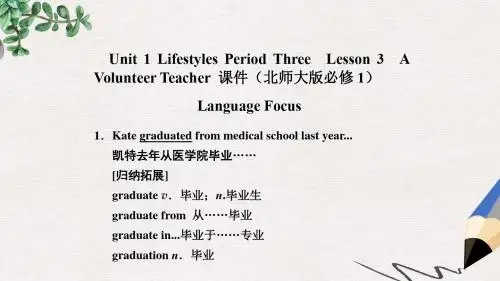
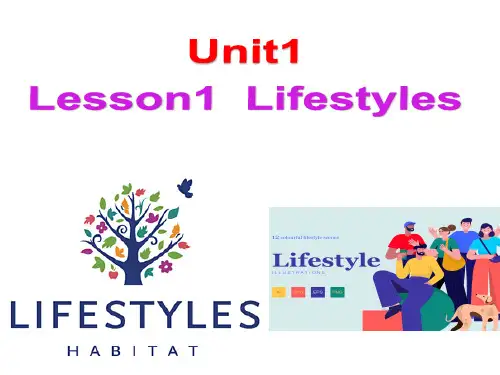
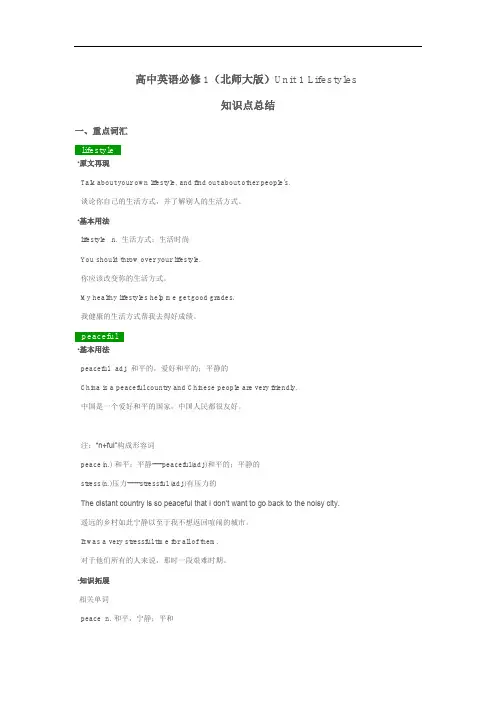
高中英语必修1(北师大版)Unit 1 Lifestyles知识点总结一、重点词汇·原文再现Talk about your own lifestyle, and find out about other people's.谈论你自己的生活方式,并了解别人的生活方式。
·基本用法lifestyle n. 生活方式;生活时尚You should throw over your lifestyle.你应该改变你的生活方式。
My healthy lifestyles help me get good grades.我健康的生活方式帮我去得好成绩。
·基本用法peaceful adj. 和平的,爱好和平的;平静的China is a peaceful country and Chinese people are very friendly.中国是一个爱好和平的国家,中国人民都很友好。
注:“n+ful”构成形容词peace(n.) 和平;平静----peaceful(adj.)和平的;平静的stress(n.)压力-----stressful (adj.)有压力的The distant country is so peaceful that I don’t want to go back to the noisy city.遥远的乡村如此宁静以至于我不想返回喧闹的城市。
It was a very stressful time for all of them.对于他们所有的人来说,那时一段艰难时期。
·知识拓展相关单词peace n. 和平,宁静;平和peacefully adv. 和平地;安静地相关短语in peace 处于和平的状态;平静地He can't live in peace with his neighbors.他不能和他的邻居和平共处。
·基本用法stressful adj. 紧张的;有压力的It was a very stressful time for all of them.对于他们所有的人来说,那时一段艰难时期。

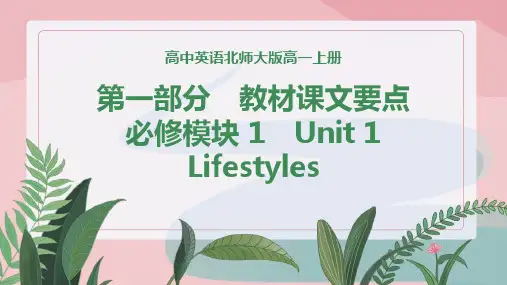
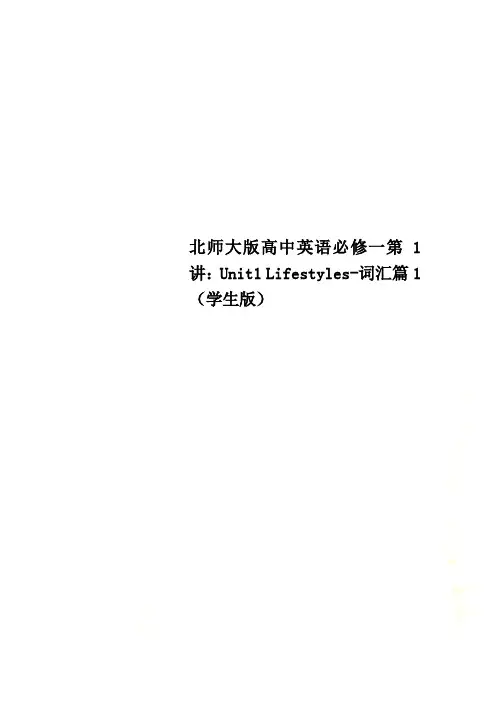
北师大版高中英语必修一第1讲:Unit1 Lifestyles-词汇篇1(学生版)③It doesn’t matter. 没关系1.peaceful adj. 和平的,平静的词汇拓展:①peacefully adv. 和平地,平静地②peace n. 和平,宁静,平静短语拓展:①in peace 平静地,和平地Don’t disturb her. Just leave her in peace. 不要打扰她。
让她安静一会儿。
②at peace 处于和平的,平静的状态She is at peace with her neighbors. 她和邻居们相处融洽。
2.relaxing adj. 轻松的,放松的词汇拓展:①relax v. (使)放松,松开,松懈②relaxation n. 消遣,休息,(对规章制度的)放宽,放松易混辨析:relaxing (物)令人放松的,令人轻松愉快的relaxed (人)感到轻松的,放松的I find cooking relaxing. 我发现烹饪令人放松。
The warm sunshine makes everyone relaxed. 暖和的阳关是大家很放松。
3.suppose vt. 猜想,认为①suppose sb./sth. to be ... 认为某人/某物是...I suppose him to be rich. 我认为他很富有。
②be supposed to do sth. (按规定,习惯,安排等)应该做某事③I suppose so. 我认为是这样的。
④I don’t suppose so./I suppose not. 我认为不是这样的。
5. switch vt. 转换,转变短语拓展:①switch on 打开(电灯,电器等)(=turn on)②switch off 打开(电灯,电器等)(=turn off)Please switch off the lights when you leave. 你离开时请把灯关掉。

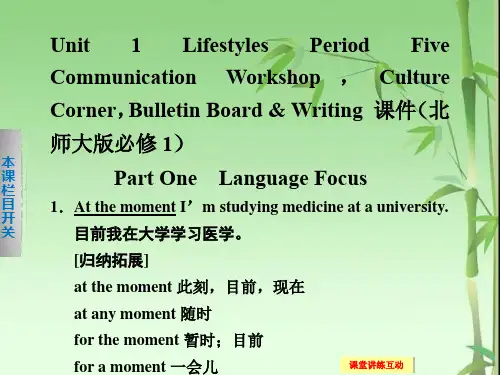
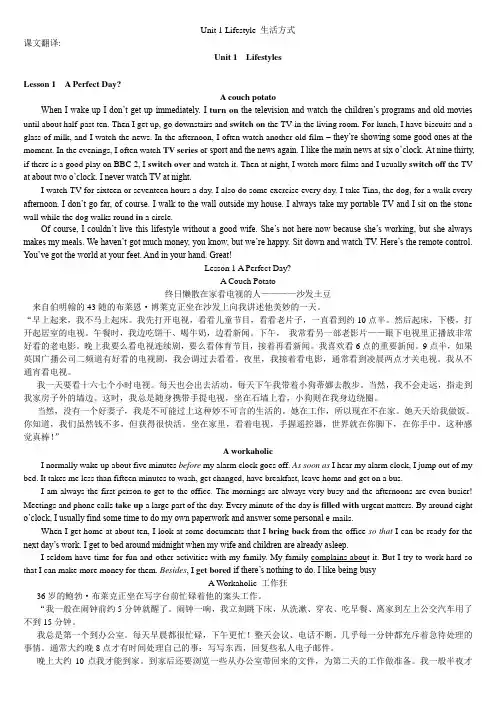
Unit 1 Lifestyle 生活方式课文翻译:Unit 1 LifestylesLesson 1 A Perfect Day?A couch potatoWhen I wake up I don’t get up immediately. I turn on the television and watch the children’s programs and old movies until about half-past ten. Then I get up, go downstairs and switch on the TV in the living room. For lunch, I have biscuits and a glass of milk, and I watch the news. In the afternoon, I often watch another old film –they’re showing some good ones at the moment. In the evenings, I often watch TV series o r sport and the news again. I like the main news at six o’clock. At nine thirty, if there is a good play on BBC 2, I switch over and watch it. Then at night, I watch more films and I usually switch off the TV at about two o’clock. I never watch TV at night.I watch TV for sixteen or seventeen hours a day. I also do some exercise every day. I take Tina, the dog, for a walk every afternoon. I don’t go far, of course. I walk to the wall outside my house. I always take my portable TV and I sit on the ston e wall while the dog walks round in a circle.Of course, I couldn’t live this lifestyle without a good wife. She’s not here now because she’s working, but she always makes my meals. We haven’t got much money, you know, but we’re happy. Sit down and watch TV. Here’s the remote control. You’ve got the world at your feet. And in your hand. Great!Lesson 1 A Perfect Day?A Couch Potato终日懒散在家看电视的人————沙发土豆来自伯明翰的43随的布莱恩·博莱克正坐在沙发上向我讲述他美妙的一天。
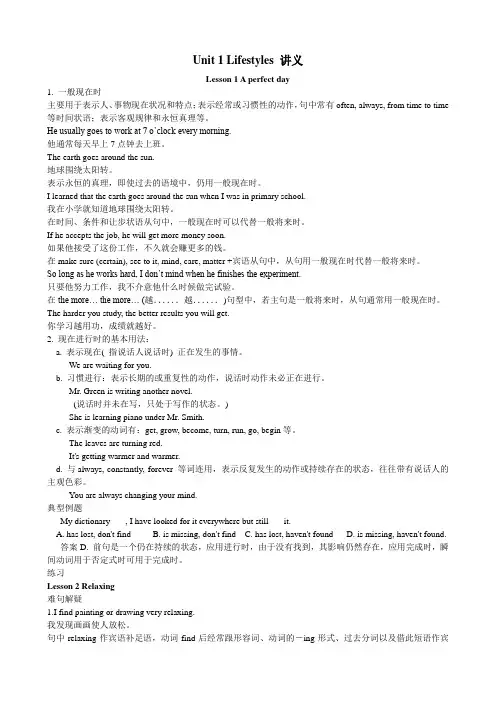
Unit 1 Lifestyles 讲义Lesson 1 A perfect day1. 一般现在时主要用于表示人、事物现在状况和特点;表示经常或习惯性的动作,句中常有often, always, from time to time 等时间状语;表示客观规律和永恒真理等。
He usually goes to work at 7 o’clock every morning.他通常每天早上7点钟去上班。
The earth goes around the sun.地球围绕太阳转。
表示永恒的真理,即使过去的语境中,仍用一般现在时。
I learned that the earth goes around the sun when I was in primary school.我在小学就知道地球围绕太阳转。
在时间、条件和让步状语从句中,一般现在时可以代替一般将来时。
If he accepts the job, he will get more money soon.如果他接受了这份工作,不久就会赚更多的钱。
在make sure (certain), see to it, mind, care, matter +宾语从句中,从句用一般现在时代替一般将来时。
So long as he works hard, I don’t mind when he finishes the experiment.只要他努力工作,我不介意他什么时候做完试验。
在the more… the more… (越......越......)句型中,若主句是一般将来时,从句通常用一般现在时。
The harder you study, the better results you will get.你学习越用功,成绩就越好。
2. 现在进行时的基本用法:a. 表示现在( 指说话人说话时) 正在发生的事情。
We are waiting for you.b. 习惯进行:表示长期的或重复性的动作,说话时动作未必正在进行。
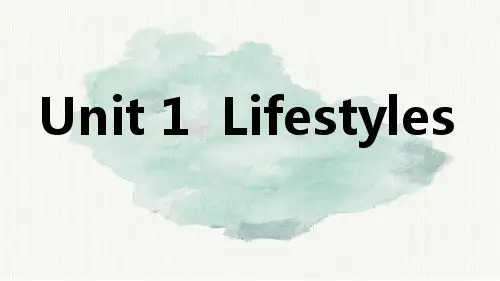
Unit 1 Life ChoicesLesson 1 Lifestyles【主题意义】本课分别介绍了Joe和Li Ying两位学生不同的生活方式,属于“人与自我”主题。
其主题意义在于通过展现Joe和Li Ying的生活方式,让学生了解生活方式的多样性,激发学生对不同生活方式的思考和选择适合自己的、积极的生活方式。
【主要内容】该课包含两个语篇。
第一个语篇介绍了英国学生Joe痴迷网络的生活状态,Joe 除了在网络上完成学习任务,还进行大量的娱乐、社交和购物活动。
Joe 对网络的依赖与痴迷引起了父母的关注和担忧,Joe 也因此开始反思自己的生活方式。
第二个语篇文本介绍了高中生Li Ying忙碌和充实的生活状态。
Li Ying的生活以学习为中心,同时还兼顾了运动和社团活动。
她有明确的目标和很强的自律能力,充分利用生活中的每一分钟实现自己的目标。
但她的生活安排得过满、缺少娱乐,与朋友相处时间太少等其他生活元素。
【文体结构】本课的两个语篇均为人物的自我介绍。
第-一个语篇主要由两部分构成:第一部分介绍了Joe在网络上进行的各种各样的活动,充分展现了他对网络的依赖;第二部分介绍了Joe的父母对Joe的担忧和Joe对自己生活方式的反思,启发学生对Joe的生活方式进行思考。
第二个语篇主要由三部分构成:第-部分介绍了Li Ying的学习情况,让读者了解到Li Ying是一个勤奋刻苦的学生;第二部分介绍了Li Ying的兴趣爱好,包括读书、运动和社团活动,展现了人物丰富的生活;第三部分介绍了Li Ying的时间管理方法,表现出Li Ying分秒必争的生活态度。
本课的两个语篇选用“digital native"和“go-getter”作为标题,充分体现了两位人物的生活方式。
两篇文章分别围绕这两个主题词展开,中心突出。
两篇文章都使用了丰富的语言来描写学生生活,例如: do schoolwork, chat with friends, set a goal for every subject, prepare myself for my degree in science in university, be attentive in classes, think actively, be a member of a volunteering club等;同时,清晰地表达了观点,例如: my parents are worried, there is a danger that... it's important to等。
高中英语学习材料(灿若寒星*制作整理)UNIT 1 LifestylesⅠ学习目标单词Warm -upboring, relaxing, stressful, peaceful, active, interesting, dangerous, exciting Lesson 1sports programmes, TV series, cartoons, game showsLesson 2stress, studio, expert, pressure, social, reduce, organise, prefer, stand Lesson 3support, solve, design, volunteer, challenge, advertisement, presentation Lesson 4accountant, crowded, career, otherwise, nearbyCommunication Workshopclassical, formal, style, cycle短语Warm-uponce a week, in one's free timeLesson 1switch on/off/over, go off, take up, be filled with, complain aboutLesson 2suffer fromLesson 3graduate from, be excited about, make a decision, be prepared for, meet challenges, to tell the truth, have a long talk, win one's support, be proud of, solve problems Lesson 4distance learning, music fan, weather forecastCommunication Workshopat the moment, over the years句型I think... but...I find... very...I prefer/like/enjoy... because...I can't stand...交际用语All the best.Can you give me...?How about...?Why don't you...?语法一般现在时和现在进行时一般将来时will,be going to及一般现在时表示将来Ⅱ质量检测形成性检测一、词组互译A.英译汉:1.once a week ________________ 2.graduate from________________ 3.meet challenges ________________ 4.win one's support________________ 5.solve problems ________________ 6.complain about________________ 7.make a decision ________________ 8.to tell the truth________________ 9.be proud of ________________ 10.be prepared for________________ B.汉译英:1.转换频道,转变________________ 2.忍受,遭受________________3.数年间________________ 4.占据________________5.把……关上________________ 6.充满着________________7.此刻、目前________________ 8.(爆竹、铃等)响________________ 9.终日懒散在家的人________________ 10.把……打开、接通________________ 二、用括号里词语的适当形式填空1.He really can't stand the ________ speech. (tire)2.At last, they ________ the problem successfully. (solve)3.She finds her new teaching job very ________ (stress)4.A group of ________ are studying on the damage caused by the earthquake. (expert) 5.Every student is eager to have a ________ holiday. (relax)6.Before Christmas, the supermarket was ________ with shoppers. (crowd)7.We can see the mountain from the ________ (distant)8.Finally, she made the ________ to study abroad. (decide)9.Li Ming is lucky enough to become one of the ________ for Beijing Olympic Games.(volunteer)10.What is your plan for the ________ weekend?(come)三、单项选择1.— Hi, Lily. I've read your latest book. It's really wonderful!— I'm glad you like it.—What's your new plan?—I ________ another book about animals next month.A.am going to write B.wroteC.am writing D.have written2.—I think being a basketball player is really exciting.—Yes, ________ sometimes it is very________.A.but... interesting B.and... interestedC.and... stressful D.but... stressful3.Having a wonderful holiday can make people________.A.relaxing B.to be relaxed C.relaxed D.to relax4.Mary always ________ to me ________ her roommate.A.complained... about B.complained... toC.complains... about D.complains... to5.—By the way, what's the time now?— Half past nine.—Please get everything ready. Mr. Black ________ at any time.A.has arrived B.is arriving C.arrive D.arrived6.When his parents came back home, they found ________ reading the book carefully.A.he B.his C.him D.himself 7.—How ________ you ________ on with your classmates now?—Quite well.A.will...get B.do... get C.did... get D.are... getting 8.—What's Tom's hobby?—Tom, as well as his brothers, ________ making models very much.A.likes B.like C.is liking D.are liking9.—I haven't seen Mr. Lee for a long time. What's he doing?—He is busy preparing for the coming test________.A.in a moment B.at the moment C.for the moment D.for a moment 10.I ________ the dictation when you ________ ready.A.will begin, were B.begin, wereC.will begin, are D.begin, are11.He is in poor health and he suffers ________ from it.A.a few B.many C.a little D.a lot12.—Did you attend the speech?—Yes, but I was ________ by the ________ speech.A.boring, boring B.bored, boring C.boring, bored D.bored, bored 13.—Where is Mrs. White?—She ________ and left five minutes ago.A.gets dressed B.puts on C.got dressed D.put on 14.—What do you think of your English study?— It's OK, but sometimes ________ difficult for me to keep up with the others in my class.A.that is B.this is C.one is D.it is15.Mr. White ________ a job as an engineer twenty years ago.A.took on B.took down C.took off D.took up四、完形填空Man has a big brain. He can 1 , learn and speak. Scientists used to think that men are 2 from animals because they can think and learn. They know now that animals can learn—dogs, rats, birds—and worms—can learn. So scientists are 3 to understand that men are different from animals because they can 4 Animals cannot speak. They make 5 when they are afraid, or angry, or unhappy. Apes (猿) are our nearest 6 They can understand some things more quickly than human beings, and one or two have learned a few 7 But they are 8 different from us. They cannot join words and 9 sentences. They cannot think like us because they have no language. They can never think about the past or the 10 Language is a wonderful thing. Man has been able to develop civilization ( 文明) because he has language. Every 11 can speak his own language very 12 when he is four or five—but 13 animal learns to speak. How do children learn?Scientists do not really know. What happens when we speak? Scientists do not know. They 14 know that man can speak because he has a big 15 .1.A.think B.act C.move D.see2.A.away B.separated C.free D.different 3.A.trying B.beginning C.intending D.getting 4.A.speak B.tell C.say D.talk5.A.voice B.cry C.a whistle D.a noise 6.A.humans B.brothers C.cousins D.friends 7.A.things B.numbers C.skills D.letters 8.A.already B.yet C.still D.quite 9.A.invent B.tell C.find D.make 10.A.future B.surroundings C.enemies D.dangers 11.A.person B.boy C.girl D.child 12.A.wonderful B.well C.clearly D.beautifully 13.A.no B.few C.such D.seldom 14.A.really B.only C.usually D.actually 15.A.head B.brain C.body D.luck五、阅读理解AOn June 17, 1774, the officials from Maryland and Virginia held a talk with the Indians of the Six Nations. The Indians were invited to send boys to William and Mary College. In a letter the next day they refused the offer as follows:We know that you have a high opinion of the kind of learning taught in your colleges, and that the costs of living of our young men, while with you, would be very expensive to you. We are convinced that you mean to do us good by your proposal (提议, 建议); and we thank you heartily. But you must know that different nations have different ways of looking at things, and you will therefore not be offended if our ideas of this kind of education happen not to be the same as yours. We have had some experience of it. Several of our young people were formerly brought up at the college of the northern provinces: they were taught all your sciences; but when they came back to us, they were bad manners, ignorant (无知的, 愚昧的) of every means of living in the woods —they were totally good for nothing.We are, however, not the less obliged (使感激) by your kind offer, though we refuse to accept it; and, to show our grateful sense of it, if the gentlemen of Virginia will send us a dozen of their sons, we will take care of their education, teach them all we know, and make men of them. 1.The passage is about________.A.the talk between the Indians and the officialsB.the colleges of the northern provincesC.the educational values of the IndiansD.the problems of the Americans in the mid -eighteen century2.The Indian chief' s purpose of writing the letter seems to be to________.A.politely refuse a friendly offerB.express their opinions on equal treatmentC.show their prideD.describe Indian customs3.According to the letter, the Indians believed that________.A.it would be better for their boys to receive some schoolingB.they were being insulted (侮辱, 辱骂) by the offerC.they knew more about science than the officialsD.they had better way of educating young men4.Different from the officials' view of education, the Indians thought________.A.young women should also be educatedB.they had different goals of educationC.they taught different branches of scienceD.they should teach the sons of the officials firstB阅读短文,根据要求回答问题。